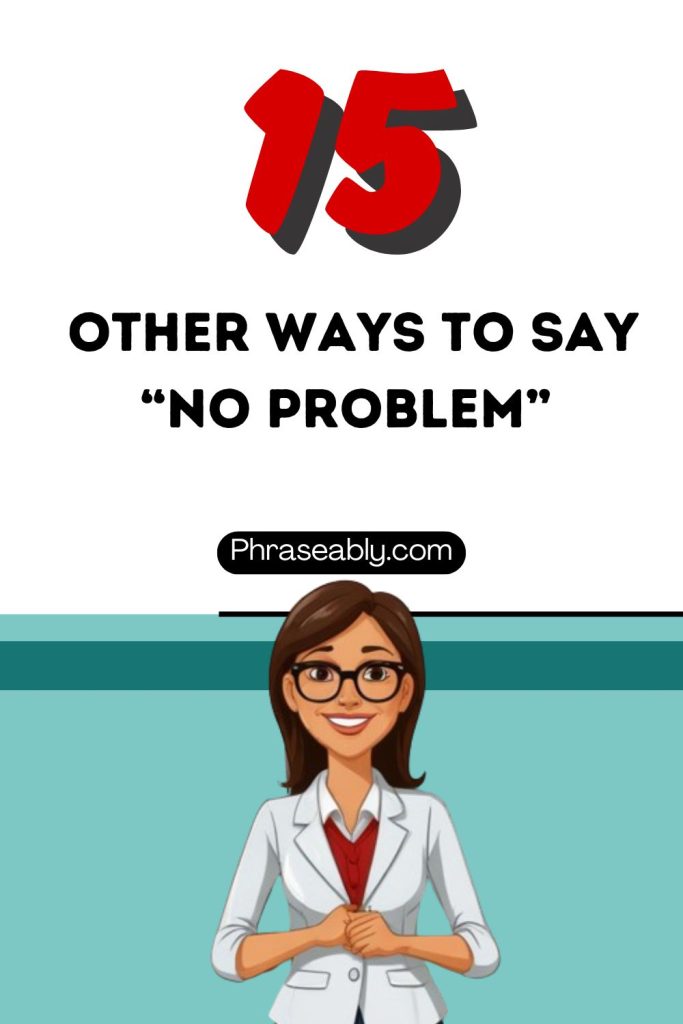It’s great that you’re thinking about variety to say “no problem.” This is because the phrase can sometimes sound too informal and may leave someone unsure if you really meant it.
Whether you’re responding to someone saying “thank you” or trying to reassure them that their request is easy to handle, having a few quick alternatives can help you sound more articulate and expressive.
In this article, you’ll discover 15 alternatives and how to use each.
Key Takeaways
- Instead of saying, “No problem”, you can tell the person, “Don’t worry about it.”
- If you’re reacting to someone telling you to thank you, it’s better to say “my pleasure” or “happy to help” instead of “no problem.”
- If you’re reacting to a mistake someone made, instead of saying “no problem,” say “It’s all good” or “Not an issue” to genuinely show that it’s no big deal.
“No problem” is a common phrase. People still even struggle with how to say “no problem” in text.
The goal is to find a group of words to help you emphasise your willingness to assist or accommodate the person’s request.
In other words, the best alternative to this expression should convey a helpful attitude. You can pick from anyone in the list below:
List of the Best Alternatives for “No Problem”
- Don’t worry about it.
- It’s all good.
- Not an issue.
- No worries.
- My pleasure.
- Happy to help.
- Don’t sweat it.
- You’re welcome.
- I appreciate your mentioning that.
- I’ve got it covered.
- I don’t want you bending backwards.
- Let’s put that behind us.
- It’s all water under the bridge.
- It’s no big deal.
- It’s all good.
As you can see, there are plenty of ways to say “no problem,” even in a humorous way. It all depends on the context and the tone you use when saying these words.
At the core, using any of the suggested alternatives will reassure the other person that the issue isn’t big enough to worry about.
Now, let’s look into detail how you can start using these responses.
1. Don’t worry about it
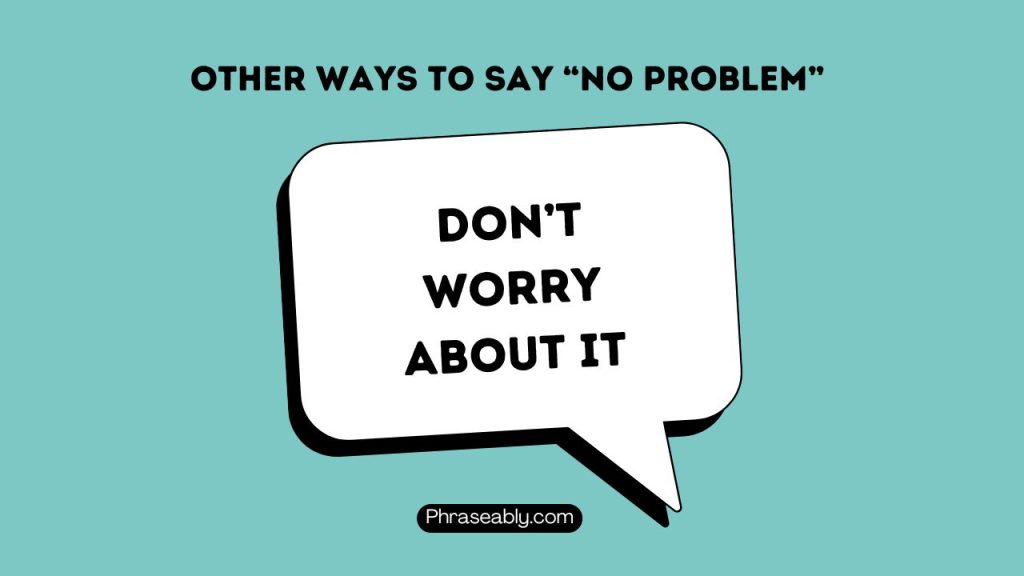
One of the best alternative ways to say “no problem” is by saying, “Don’t worry about it.”
It is recommended to use this substitute phrase, especially in cases where you need to sound genuine.
It works for instances where someone is offering to help get something done or trying to fix a problem they caused, and you tell them not to worry about it to show that it is not of great concern.
Many people express this as “no worries,” but it sounds better when you say “don’t worry about it” politely.
2. It’s all good
Just as “no problem” will work fairly well for situations where someone made a mistake or tries to appreciate you, it is the same way the phrase “It’s all good” will work for both instances.
However, it’s particularly true when someone keeps on appreciating you for a favour you did for them, and you want them to realise that it’s no big deal and that you’ll be otherwise cool without their excessive gratitude.
“It’s all good” also sounds appropriate when you’re trying to tell someone that the past is gone and you’re not aggrieved by any immediate mistake or wrong they’ve done.
3. Not an issue
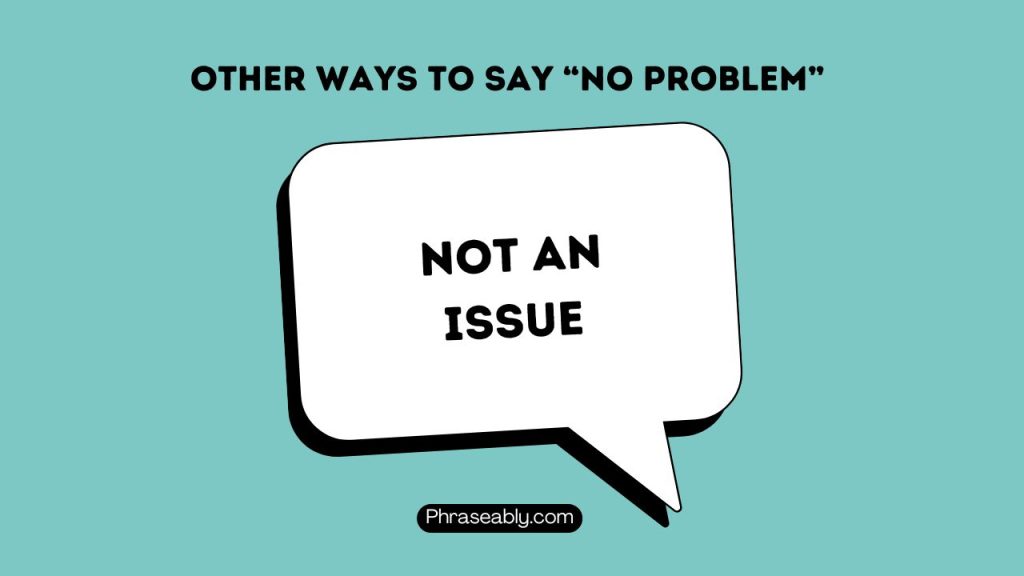
When someone does something wrong that is not of great concern to you, and they want to apologise, you can say “not an issue” instead of “no problem.”
Saying “no problem” at that point can easily make it seem as though you are indeed holding back something, but you just want to put it off.
But saying “not an issue ” is more direct and can seem sincere.
It means that whatever the person has done does not cause anything you’d consider an issue.
4. No worries
“No worries” is an informal way to say “don’t worry about it,” which we recommended earlier.
There’s no difference between both expressions. However, you use “No worries” as a replacement for “no problem,” especially when talking to your friends or in an informal setting.
Depending on the situation, it’s also an excellent way to say “no problem” in office or school settings.
It works for both when someone is trying to apologise and you don’t want them to make a great deal out of it.
5. My pleasure
In English, “My pleasure” is an idiomatic expression that means you’re very happy to help.
This makes it perfect to say when you help someone and they tell you, “Thank you.” It sounds better to the ear than saying, “No problem.”
The person will be convinced that you were happy doing whatever favour you did for them.
Another way to rephrase this alternative to suit a formal context is “The pleasure is absolutely mine.”
6. Happy to help
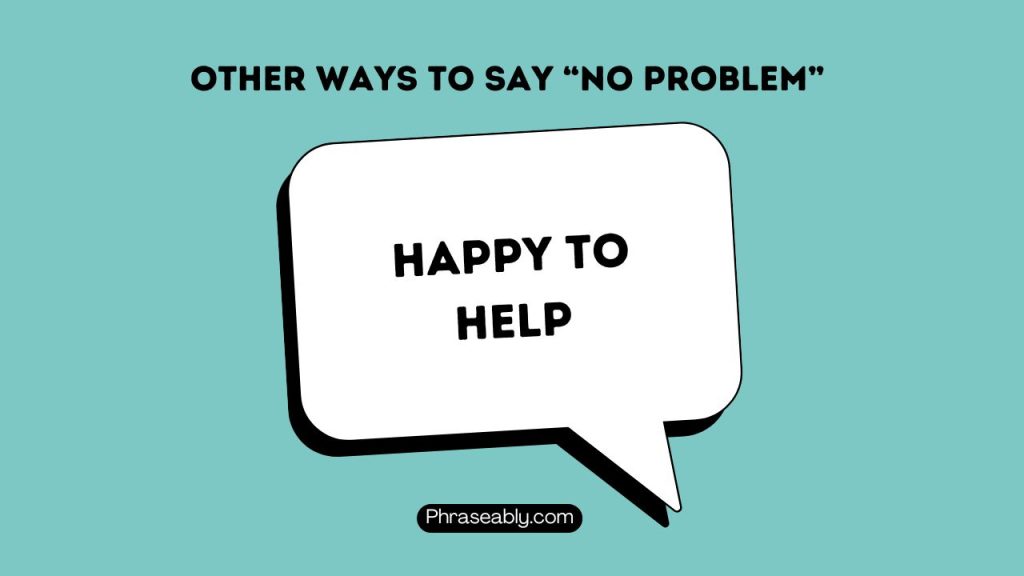
If you don’t want to use any idiom in expressing yourself, simply and plainly tell the person you were happy to help instead of saying “No problem,” which can mean many things.
This is because it can leave the person wondering, “Was there supposed to be a problem?”
Meanwhile, “happy to help” will only work when someone is thanking you for the help you rendered.
7. Don’t sweat it
“Don’t sweat it” is another idiomatic alternative to “no problem.” In English, it means you shouldn’t break a sweat about an issue you believe to be serious when it isn’t in reality.
So, telling someone, “Don’t sweat it,” means the situation does not cause any concern or inconvenience.
8. You’re welcome
“You’re welcome” is a polite response after someone thanks you. It acknowledges their gratitude and adds a touch of kindness to the conversation.
By using this phrase, you will even pleasantly surprise the other person with your thoughtfulness.
9. I appreciate you mentioning that
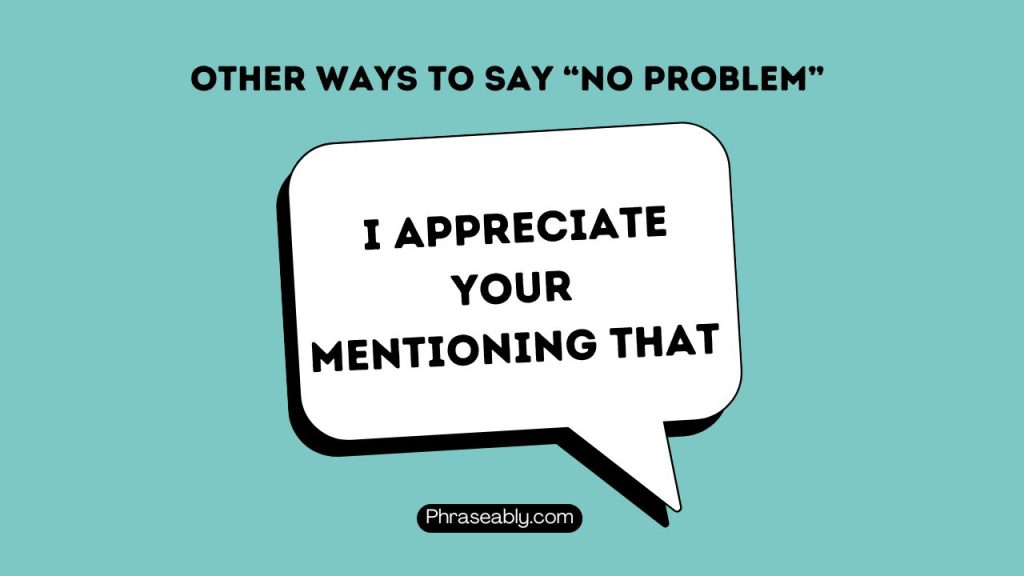
“I appreciate you mentioning that” is another excellent alternative to “no problem” and can be used in various situations.
As someone who has run an inn, I often receive guest requests, and I prefer to say, “I’ll take care of that” or “I appreciate you mentioning that.”
These responses are more optimistic while saying “no worries” might suggest there was potential for concern, even if there isn’t any now.
10. I’ve got it covered
It’s nice to be surrounded by people who can sense a need for concern or have your best interest in mind. They could want to offer to help you fix something—perhaps, something they had a hand in damaging out of a mistake.
In such a situation, it sounds more positive to say, “Thanks but I’ve got it covered or handled” instead of “No problem.
It sounds more genuine.
11. I don’t want you bending backwards
If the person is offering to help and you know you don’t need it, you can tell them, “I don’t want you bending backwards,” which sounds more grammatically correct for such context than “No problem.”
It’s even trickier to use the phrase “no problem” in such a situation because it conveys the subtle impression that there could possibly be a problem if they don’t offer to help.
12. Let’s put that behind us
When you put something behind you, you’re willing to move on from it and no longer give it too much thought or let it bother you.
This sounds similar to the message you’d want to send by saying “no problem” to someone. That’s why “let’s put that behind us” is an excellent replacement for “no problem.”
But there’s a creative way to say the phrase, which takes us to the next section.
13. It’s all water under the bridge
If you have a misunderstanding with someone and they try to bring it up when you’ve already moved on, you can tell them, “It’s all water under the bridge.”
This statement is an idiom that means something happened in the past and is no longer important or worth arguing about.
You can see why it’s a perfect thing to say instead of “no problem,” especially for already resolved situations.
14. It’s no big deal
Another great option is to say, “It’s no big deal,” which is pretty straightforward.
Unlike “no problem,” this phrase helps you point out that the person may have done something less than ideal, but it’s not severe enough to cause any real concern or affect your relationship.
That’s why you’ll often hear this phrase between staff and supervisors or servers and customers.
15. Thank you, but it’s fine
“Thank you, but it’s fine” has a casual and reassuring tone, making it perfect for replacing “no problem.”
It still conveys the same message: everything is fine without issues or problems.
The Bottom Line
When saying something similar to “no problem” without using those exact words, you must first consider the context.
Many people use this phrase when responding to someone’s mistake, saying that they don’t worry about it or responding to a “Thank you.”
Just make sure the substitute phrase you pick communicates that the situation is completely acceptable and causes no problem or inconvenience.
